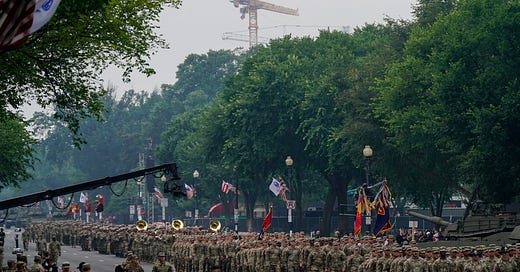The Split-Screen Nation
Amidst the clanging cacophony of the leftist coast or the no-kings blather trumpeted by the legacy media, I chose the magnificent spectacle organized by Donald Trump.
By Kenneth Allard
Last weekend the nation was on another of its schizophrenic flights about whom they should listen to and in what they should believe. Amidst the clanging cacophony of the leftist coast or the no-kings blather trumpeted by the legacy media, I chose the magnificent spectacle organized by Donald Trump on the occasion of the Army’s 250th birthday.
After having spent a quarter-century, draftee-to-colonel, as a proud member of that Army, I know very well that parades are actually meant for those not part of our ranks, particularly the young people whose military educations are so scandalously overlooked. Instead, they are mis-educated by the Randy Weingartens of the world, schooled in privilege by a society where the only ethos seems to be self-indulgence. As we watch the exquisite heroism of the IDF, the blood-sacrifices of Ukrainian infantry, do our generations still deserve the freedom purchased at such great price?
A tentative response came as real Americans ignored the half-messages of their TV screens to witness the timely history lesson presented on Constitution Avenue by Donald Trump. As was proper, homage was paid to the combat power generated in each historical generation. You who shout “No Kings;” did you see those Revolutionary War uniforms of Washington’s Continentals? Do you remember the price paid for our Republic when Lord Cornwallis surrendered at Yorktown? When you lift your voices to cry out “No Slaves;’ Trump’s riposte was those blue-clad ranks who closed with their enemies from Bull Run to Appomattox Court House, ending slavery with a blood-sacrifice. Hey, Mom and Dad, why did they never teach us these lessons in school, especially those hard battles preceding Juneteenth?
The tableau also covered the wars of the twentieth century, uniforms and equipment changing but never the constancy of purpose epitomized by American combat arms. For an old soldier, those changes inevitably recalled distant memories: re-building an Army shattered by Vietnam, confronting Soviet military power and renewing our fighting spirit while deployed on the sands of the Middle East. That last memory immediately brought me back to the present because Israel had launched its long -overdue retaliation against Iran only hours before the Great Parade began. Glorious though it was, what lessons from our history should be applied at such a moment?
That question recalled the many lessons our Army learned from Israel as we watched them defeat Arab armies deploying precisely the same Soviet equipment we were then facing on NATO’s front lines. We learned that Soviet tactics were top-heavy, centralized and surprisingly vulnerable to an opponent trained to use their overwhelming numbers against them. We also learned that the IDF was an endlessly inventive, innovative force seemingly able to out-think their opponents as well as out-fight them. And as an intelligence officer, I had unlimited respect for the Israeli Mossad, from the classic disciplines to state-of-the-art cyber and electronic warfare.
Our long confrontation with Iran began while I was a graduate student at Harvard en route to the West Point faculty. Coincidentally, one of my closest friends was Ian, a recently retired Army officer who had escaped his last assignment at the US Embassy Tehran only hours before the ayatollahs took over. Ian was also an expert in guerrilla warfare, having spent four combat tours leading Montagnards against the Vietcong. So I listened carefully as Ian took on one of our most celebrated Harvard authorities, an expert in non-confrontational negotiations. Ian listened respectfully to him but then delivered a counter-stroke for the ages.
“Professor, your strategy for “getting to yes” probably works real well in your law school classes. But forgive me for saying that it wouldn’t work quite as well in Iran, where the ayatollahs would like nutthin’ better than to cut your heart out and ROAST IT OVER A SLOW FAHR.”
The professor and his Harvard audience gasped but no one cared to argue that Ian was wrong. In the years since, I have become even more impressed with Ian’s insight into his Iranian enemy – a people who after all invented chess. As an old soldier, I also admire Donald Trump’s caution about the limits of American power. But weigh those ideals against the convictions of both Winston Churchill and Bibi Netanyahu: that you should believe an enemy when he plans to kill you. So if our best ally in the Middle East needs help in eliminating either the ayatollah or his nuclear reserves, then I believe 250 years of American military history would cheer on President Trump and wish him godspeed.
Colonel (Ret.) Ken Allard rose from draftee to become a West Point professor, Dean of the National War College and NBC News military analyst.





Good Choice, Ken, to watch something productive and enlightening - the Army 250th Birthday Parade!
Hope the self-indulgent got some enlightenment about the history of our Army and its contributions to our security since the Revolutionary War. For me, watching the parade reinforced my proud feelings regarding my Army career. It was great to see the 40 helos, 6,000 troops representing every Army division, the Reserves, & National Guard. We are a Total Army and our future is bright as exhibited by the USMA, Citadel, VMI Cadets and Aggies. Their marching was crisp and only exceeded by the Robo Dogs.
Read and heed!